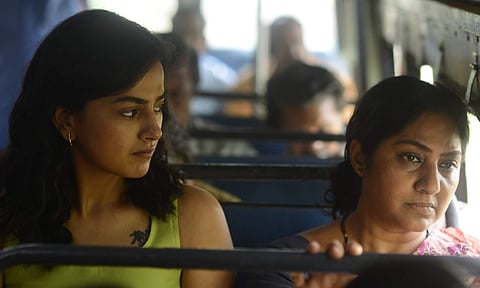Witness Movie Review: A highly impactful, multi-layered social commentary
Rating:(4 / 5)
Debutant Deepak's Witness is a daring film for a lot of reasons. It takes manual scavenging, a rarely-discussed social issue, as its core and questions everyone in the system who are both passively and actively enabling it. In an equally daring move, the promos of the film almost gave out the entire story, including the ending. This could have been a disastrous step for any film, but Deepak manages to use it as a tool to draw the focus of the audience towards the life of its characters, without letting us worry much about the course of the rather conventional plot.
Cast: Rohini, Shraddha Srinath, G Selva, Shanmuga Raja
Director: Deepak
Witness is the story of an underprivileged mother's (Rohini as Indrani) fight for justice following the death of her 20-year-old son Parthiban, who was forced into manual scavenging. Despite knowing that she is fighting an impossible battle, we root for her and the film, because of the unique writing and execution.
For starters, Deepak makes us develop a strong liking for Parthiban. Be it his ever-smiling face or the warm conversations he has with his mother, everything about this person is endearing. He is probably the ideal kid every mother wishes to have. When such a noble soul is lost, it is natural for us to feel affected. Then we are introduced to the comrades supporting Indrani and the powers that be who forced Parthiban down the death pit. And finally, we have the common link, Parvathy (Shraddha Srinath), who is a conscientious inhabitant of the apartment where Parthiban's life was lost.
Fascinatingly, the screenplay, written by Muthuvel, provides every main character a challenge, a want, and an arc, which complements the main narrative. The writing ensures that their paths cross each other giving rise to engaging sequences. For instance, comrade Prithviraj (an effective G Selva) and the good-natured lawyer (Shanmuga Rajan) see every positive court hearing as a trophy and celebrate the win, even as a traumatised Indrani walks out of the court not wanting to hear the details of her son's death. Though all three are inherently good people, each have a different reason to take up the case. If Prithviraj wants this case to set a precedent for other Dalit people forced into manual scavenging, the lawyer processes it as a professional success, but for Indrani, it is a very personal battle. All these minute details aren't served as expositions but are established through the adept filmmaking of Deepak, who also shot the film.
Apart from its strong social message against manual scavenging, the film also registers many important issues that are the root causes of it. Be it the reckless slum clearance that forced people to migrate to the outskirts of the city to the underpayment and exploitation of sanitary workers, the writers ensure it isn't just a superficial look at a pertinent issue.
Witness will be long remembered for the kind of conversations the women have in the film. Out of the several exchanges between Parvathy and Indrani, one scene that stands out is their discussion about each other's mental health. I believe scenes like these are a good start for the betterment of the writing of female characters and mental issues.
It is also impressive how every character in Witness is extremely grounded. For instance, when Parvathy informs Indrani about the CCTV footage of Parthiban's death, Indrani fails to process it as a piece of evidence and instinctively wishes to see it as it has her son's face. In another court hearing, the lawyer mentions the cruelty Parthiban went through, a borderline guilt-stricken Parvathy keeps nodding her head in approval in the background. Nifty touches by Deepak ensure that we are completely invested in the hard-hitting story. It is interesting how this tightly-packed film manages to register the mundane life of Indrani.
Despite being a courtroom drama, the film keeps the dialogues as minimal as possible. The measured silences prepare us for the impact of what comes next. When Indrani looks longingly at the place where she used to live happily in the past, and says,"Inga ellam apo sandhoshama irundhom, ipo vazhkaiyum odudhu naanum odren!" it is a punch to the gut.
It is really heartening to see a consummate performer like Rohini finally get to play a full-fledged lead after ages. The way she process grief in the first act or the meltdown sequence in the pre-climax are just examples of the range of the actor. Shraddha, on the other hand, beautifully pulls off an intricate performance as Parvathy, who is forced to put up a brave face every single day even while longing for affection within. It is not easy to look overwhelmed and enervated for the majority of the film and yet keep the audience invested. But Shraddha does it effectively throughout.
Though people may have divided opinions on the climax and the execution, I felt it was shot in a very innovative way. It leaves a strong reminder that all of us will be reduced to mere witnesses of injustice unless we join forces as a society.

